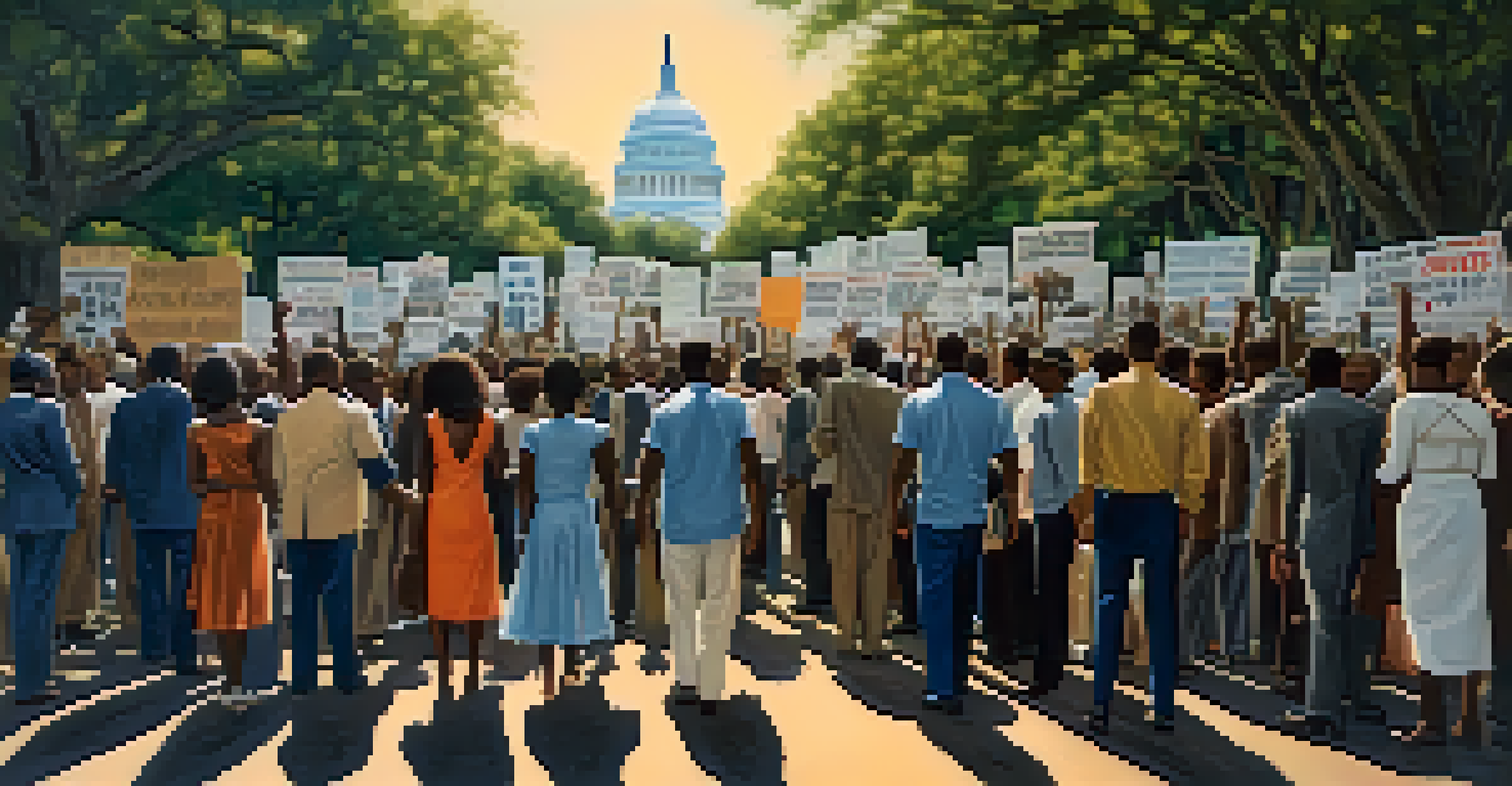Andrew Young: A Visionary Leader in the Civil Rights Movement

Early Life and Influences Shaping Andrew Young
Andrew Young was born on March 12, 1932, in New Orleans, Louisiana. Growing up in a segregated South, he experienced firsthand the racial injustices that would later motivate his lifelong activism. His father, a dentist, and his mother, a schoolteacher, instilled in him the values of education and community service, laying a foundation for his future endeavors.
Injustice anywhere is a threat to justice everywhere.
Young’s academic journey took him to Dillard University, where he earned a degree in theology. During this time, he became heavily influenced by the teachings of Mahatma Gandhi, particularly the principles of nonviolent protest. This blend of personal experience and academic learning sparked his passion for civil rights, leading him to join the movement actively.
With a commitment to justice and equality, Young began working with the Southern Christian Leadership Conference (SCLC), where he would soon emerge as a prominent figure. His early experiences shaped his vision for a more equitable society, setting the stage for his significant contributions to the Civil Rights Movement.
Role as a Key Strategist in the Civil Rights Movement
Andrew Young played a critical role as a strategist during pivotal events in the Civil Rights Movement. He was instrumental in organizing the 1963 Birmingham Campaign, which aimed to challenge segregation through peaceful protests. Young's leadership helped to coordinate efforts between various civil rights groups, showcasing his ability to unite diverse voices for a common cause.

His work during the Birmingham Campaign not only drew national attention to the plight of African Americans but also highlighted the power of nonviolent resistance. Young’s strategic thinking was evident in how he navigated challenges and adapted plans to ensure the movement's goals were met. His efforts contributed to the eventual passage of the Civil Rights Act of 1964.
Young's Early Life Fueled Activism
Growing up in a segregated South, Andrew Young's experiences with racial injustices inspired his lifelong commitment to civil rights.
Young's influence extended beyond Birmingham, as he played a significant role in the Selma to Montgomery marches. His ability to articulate the movement’s goals made him an effective spokesperson, and his commitment to nonviolence became a benchmark for future demonstrations. Through these strategic efforts, Young solidified his status as a leading figure in the fight for civil rights.
Impact of Andrew Young's Leadership on Legislation
Andrew Young's leadership in the Civil Rights Movement was instrumental in shaping key legislation that advanced racial equality. His advocacy work contributed to the passage of the Voting Rights Act of 1965, which aimed to eliminate barriers preventing African Americans from voting. Young understood that access to the ballot was crucial for empowering communities and ensuring their voices were heard.
The time is always right to do what is right.
He was not just a leader but also a negotiator, working behind the scenes to bring together various stakeholders to support civil rights legislation. Young's ability to engage with lawmakers and community leaders demonstrated his commitment to fostering dialogue and collaboration. This approach helped bridge gaps and build coalitions that were essential for securing legislative victories.
As a result of these efforts, Young's impact on legislation extended beyond the Civil Rights Movement. His contributions paved the way for future policies aimed at promoting equality and justice in America. Young's legacy as a leader in this transformative era continues to inspire ongoing efforts for social change.
Andrew Young's Vision for Economic Justice
In addition to civil rights, Andrew Young championed economic justice as a vital aspect of the struggle for equality. He believed that true liberation required not only political rights but also economic opportunities for African Americans. Young advocated for economic empowerment through education, job training, and entrepreneurship, recognizing that systemic inequalities extended beyond the political realm.
As a key figure in the Southern Christian Leadership Conference, Young pushed for initiatives that supported economic development in marginalized communities. He understood that by addressing economic disparities, communities could gain greater control over their futures. This vision was reflected in his support for programs aimed at creating jobs and fostering business ownership among African Americans.
Strategic Leadership in Civil Rights
Young played a pivotal role in key events of the Civil Rights Movement, including the Birmingham Campaign and Selma to Montgomery marches.
Young’s work in economic justice was groundbreaking and laid the foundation for future initiatives that focused on wealth-building in underserved communities. His holistic approach to civil rights emphasized that social change must encompass economic upliftment, making his contributions relevant in today's discussions about racial and economic equity.
Transitioning to Politics: Young's Political Career
Andrew Young's dedication to public service naturally led him to a political career, where he continued to champion civil rights and social justice. In 1972, he made history as the first African American elected to Congress from Georgia since Reconstruction. His election was a significant milestone, signaling a shift in the political landscape and the increasing representation of African Americans.
During his time in Congress, Young focused on issues such as affordable housing, education, and international human rights. He used his platform to advocate for policies that aimed to uplift disadvantaged communities, demonstrating that his commitment to social justice extended beyond civil rights activism. Young’s legislative work reflected his belief that change could be achieved through both grassroots activism and political engagement.
Young's transition to politics illustrated how civil rights leaders could influence systemic change from within government. His ability to navigate the political arena while remaining true to his activist roots made him a unique figure in American history. Young's legacy in politics continues to inspire future generations of leaders to seek change through public service.
Global Impact: Young's International Advocacy
Andrew Young's influence reached far beyond the borders of the United States, as he became a prominent international advocate for human rights. Appointed as the U.S. Ambassador to the United Nations in 1977, Young used his position to address global issues of inequality and injustice. His work at the UN allowed him to advocate for oppressed communities worldwide, emphasizing the interconnectedness of human rights struggles.
Young's diplomatic efforts focused on promoting peace and cooperation among nations, particularly in Africa. He played a crucial role in advocating for the end of apartheid in South Africa, working alongside leaders like Nelson Mandela. Young's commitment to justice and equality resonated on a global scale, showcasing how civil rights activism could inspire international movements for change.
Global Advocate for Human Rights
As U.S. Ambassador to the UN, Young extended his advocacy for equality and justice to a global stage, particularly in the fight against apartheid.
His international advocacy underscored the importance of solidarity among marginalized communities across the globe. Young's legacy as a global leader in human rights continues to remind us that the fight for justice transcends borders, and that collective action is essential for creating a more equitable world.
Legacy and Continuing Influence of Andrew Young
Andrew Young's legacy as a visionary leader in the Civil Rights Movement is profound and enduring. His contributions to social justice, economic empowerment, and international human rights continue to inspire activists and leaders today. Young's life exemplifies the idea that one person can make a significant difference, and his work serves as a reminder of the importance of persistence in the quest for equality.
Through his various roles—activist, politician, diplomat, and educator—Young has left an indelible mark on American society. His commitment to nonviolence, dialogue, and collaboration has become a blueprint for effective activism. Young's ability to engage with diverse communities and build coalitions remains a valuable lesson for current and future leaders in the fight for justice.

Today, Andrew Young's influence can be seen in ongoing movements advocating for civil rights and social justice. His vision for a just society continues to resonate, and his story serves as a powerful reminder of the progress that can be achieved through dedication and unity. As we reflect on his contributions, we are encouraged to carry forward his legacy in our own pursuits for a more equitable world.